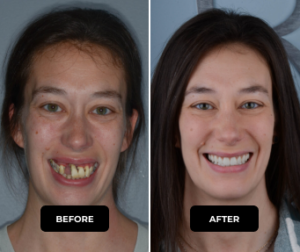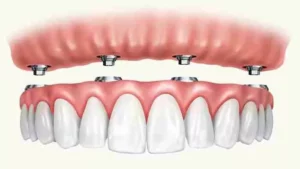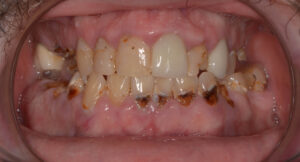
Imagine transforming your smile, boosting your confidence, and enjoying the simple pleasures of eating comfortably and speaking clearly. Dental implants before and after can be a life-changing solution for those struggling with missing or failing teeth.
In this blog post, we will explore the powerful impact of dental implants and the variety of solutions they offer, from single tooth replacements to full arch rehabilitations. Let’s dive into the world of implant dentistry and discover how it can change lives for the better!
Key Takeaways
- Dental implants are a reliable and long-lasting solution for restoring your smile.
- From single teeth to full arch rehabilitations, implant dentistry is incredibly versatile.
- Let’s find out if dental implants are right for you by assessing overall health, bone density, and lifestyle habits.
The Power of Dental Implants: Missing Teeth to Complete Smiles

Dental implants have the remarkable ability to replicate the shape and purpose of real teeth, filling the void left by tooth loss and preserving the integrity of your remaining teeth. Restoring upper teeth through dental implants is particularly important as it enhances both function and aesthetics, significantly improving the patient’s overall smile. Whether you’ve lost a single tooth or multiple teeth, dental implants can completely transform your smile, giving you the confidence to show off your pearly whites.
We’ll examine a variety of dental implant transformations for the upper and lower jaw, ranging from single tooth replacements to comprehensive full mouth makeovers. See some before and after pictures.
Single Tooth Implant Transformation
A single tooth implant can be a game-changer, especially when filling the gap left by missing front teeth. The dental implant not only restores the appearance of your smile but also functions just like a natural tooth, allowing you to eat and speak with ease.
Consider the boost in confidence you’d feel when the visible gap in your smile is replaced with a beautiful, natural-looking tooth that blends seamlessly with your other teeth. The single tooth implant truly offers a transformative impact on both your appearance and confidence.
Multiple Teeth Implant Makeover
For those missing several teeth, a multiple teeth implant makeover can work wonders in restoring both the appearance and function of your smile. One popular method is the all-on-four technique, which uses four implants to secure a full arch of teeth. This technique is particularly effective for restoring upper teeth, significantly enhancing both function and aesthetics.
The procedure is meticulously planned, with immediate dentures created on the computer before surgery, ensuring a precise and comfortable fit. The end result is a full-mouth restoration that feels as close to natural teeth as possible, giving you the freedom to enjoy your favorite foods and speak with confidence, while also providing an option for those who may require partial dentures or an upper denture.
Versatility of Implant Dentistry: From Individual Teeth to Full Arches
Implant dentistry offers a wide range of tooth replacement solutions, catering to various patient needs and preferences. From single tooth replacements to full arch rehabilitations, dental implants provide a strong and natural-looking result that can significantly improve your quality of life.
In addition to implants, other treatments that can be used in combination to achieve your desired smile makeover include:
- Porcelain veneers
- Zirconia or porcelain crowns
- Teeth whitening
- Orthodontic care
We’ll further investigate the versatility of implant dentistry, focusing on treatment options for individual teeth, implant-supported bridges, and full arch solutions.
Replacing a Damaged Tooth with an Implant
When a tooth is damaged beyond repair, a dental implant can be the perfect solution to restore both the appearance and function of the tooth. The process begins with a thorough examination of your oral health, followed by a discussion of your goals and expectations.
Once the damaged tooth is extracted, the dental implant procedure involves several steps:
- The implant is surgically placed into the jawbone.
- After a healing period of 2-3 months, during which the implant integrates with the surrounding bone and tissue, an abutment is placed on the implant.
- Finally, an implant crown is cemented onto the abutment to complete the restoration.
The result is a strong, natural-looking implant crown that blends seamlessly with your existing teeth.
Implant-Supported Bridges for Multiple Teeth Replacement
For patients with multiple missing teeth in a row, dental bridge supported by implants offers a stable and long-lasting solution. Utilizing two or more dental implants as anchors, the bridge is securely attached, providing a natural-looking and functional tooth replacement.
The process typically begins with a consultation, followed by the surgical placement of the implants and the restoration process to attach the bridge. The result is a restored smile that looks, feels, and functions as if the missing teeth were never gone.
Full Arch Rehabilitation with Dental Implants
Full arch rehabilitation with dental implants is a comprehensive treatment that replaces all missing teeth in an arch, providing a complete and confident smile even for patients with extensive tooth loss. The procedure involves placing multiple dental implants in the jawbone, which act as anchors for a fixed dental prosthesis or bridge. This allows for the restoration of a full arch of teeth, improving aesthetics, function, and oral health.
For those who have lost all or most of their teeth, full arch rehabilitation with dental implants can be a life-changing solution that restores their smile and confidence.
Overcoming Failing Teeth with Dental Implants
In some cases, dental issues such as failed root canals, broken crowns, and bridges may lead to failing teeth, including lower teeth, that need to be replaced. Dental implants can provide a long-lasting, reliable solution for these patients, allowing them to overcome their dental challenges and regain a confident smile. Additionally, replacing failing upper teeth with dental implants can significantly enhance both function and aesthetics, offering patients a comprehensive improvement in their oral health.
Next, we’ll examine how dental implants can aid patients who’ve experienced failed root canal treatments and broken crowns and bridges.
Failed Root Canal Treatment
A failed root canal treatment can be a frustrating and painful experience for a patient. In these cases, dental implants can provide a viable solution by replacing the affected tooth. Not only do dental implants restore the appearance and function of the tooth, but they also eliminate the need for further root canal treatments and related complications.
By choosing dental implants, patients can put the pain and discomfort of failed root canal treatments behind them and embrace a healthier, more confident smile.
Broken Crowns and Bridges
Broken crowns and bridges can be both uncomfortable and unattractive, impacting a patient’s ability to eat, speak, and smile with confidence. Dental implants offer a strong and natural-looking solution for replacing these damaged restorations. By surgically placing the implant into the jawbone and attaching a new implant crown or bridge, patients can enjoy a restored smile that is both functional and aesthetically pleasing.
No longer burdened by failing dental work, patients can embrace the transformative power of dental implants and smile with confidence, enjoying their new smile.
Real-Life Examples of Dental Implant Success

Before and After Photos
Seeing is believing, and nothing illustrates the incredible transformation that dental implants can achieve better than before and after photos. These images capture the journey from missing teeth to a complete, radiant smile, highlighting the remarkable changes that dental implants can bring.
In the before photos, you might notice gaps where teeth are missing, affecting both the appearance and function of the smile. These gaps can make it difficult to eat, speak, and smile with confidence. However, the after photos tell a different story. With dental implants in place, the smile is restored to its natural beauty, with implant crowns that blend seamlessly with the remaining teeth.
The transformation is not just cosmetic; dental implants also restore the function of natural teeth, allowing patients to enjoy their favorite foods and speak clearly. The stability provided by the implants ensures that the new teeth feel secure and comfortable, just like natural teeth.
These real-life examples of dental implant success showcase the life-changing impact of implant dentistry. Whether it’s a single dental implant or a full arch rehabilitation, the results speak for themselves, offering a glimpse into the possibilities that dental implants can provide.
The Journey to a Confident Smile: Dental Implant Process and Timeline
The dental implant process involves several steps, from the initial consultation and treatment planning to the surgical placement and final restoration of the implants. While the journey may seem lengthy, the end result is a confident, natural-looking smile that can last for many years to come.
Next, we’ll guide you through the stages of the implant process, from the initial consultation to the final result, providing a clear picture of what to expect on your path towards a confident smile.
Initial Consultation and Treatment Planning
During the initial consultation at the dental office, your dentist will evaluate your oral health, take X-rays or CT scans of your patient’s mouth, and discuss your treatment goals and expectations. This comprehensive assessment will help your dentist determine if you are a good candidate for dental implants and create a personalized treatment plan tailored to your needs.
With this knowledge, you can make a well-informed decision about the suitability of dental implants for your situation, setting you on the path towards your goal of a confident, healthy smile.
Surgical Placement of Implants
The surgical placement of dental implants is a crucial step in the process, as it ensures a strong foundation for the final restoration. During the surgery, your dentist will make an incision in the gum, create a space for the implant, and insert the implant into the jawbone.
Following the procedure, the implant will require a healing period, during which it fuses with the surrounding bone and tissue, providing a secure anchor for the crown or denture. This healing process can take several weeks to a few months, depending on the individual patient and the complexity of the implant placement.
Restoration and Final Results
Once the implant has healed and integrated with the surrounding bone and tissue, the final restoration process begins. This involves placing the abutment, a small connector post, onto the implant, followed by the placement of the crown, bridge, or denture. The final result is a beautiful, confident smile that looks, feels, and functions just like natural teeth.
With proper care and maintenance, your dental implants can last for many years, often an entire lifetime, offering a long-lasting solution to missing or failing teeth.
Are Dental Implants Right for You?
While dental implants can be a transformative solution for many patients, they may not be suitable for everyone. Factors such as overall health, bone density, and lifestyle habits can play a role in determining whether dental implants are the right choice for you.
Next, we’ll delve into some of the health considerations and bone density factors that might influence your eligibility for dental implants.
Health Considerations
Your overall health plays a significant role in determining whether dental implants are a suitable option for you. Certain conditions, such as uncontrolled diabetes or gum disease, can increase the risk of infection and impact the success of dental implant treatment.
During your initial consultation, your dentist will assess your overall health and discuss any potential concerns related to your candidacy for dental implants. This comprehensive evaluation helps to ensure the best possible outcomes for your dental implant journey.
Bone Density and Grafting
Adequate bone density is crucial for the successful placement of dental implants, as it provides a strong and stable foundation for the implant to integrate with.
In some cases, patients with insufficient bone density may require bone grafting, a surgical procedure that replaces or repairs damaged bone, in order to create a suitable foundation for dental implants.
By addressing bone density concerns and exploring bone grafting options, you can ensure the best possible foundation for your dental implants and pave the way for a successful and confident smile.
Summary
In conclusion, dental implants offer a powerful and versatile solution for those struggling with missing or failing teeth. Whether you require a single tooth replacement, a multiple teeth makeover, or a full arch rehabilitation, dental implants can provide a long-lasting, natural-looking, and functional solution that can truly transform your life.
By understanding the dental implant process, health considerations, and bone density factors, you can make an informed decision about whether dental implants are the right choice for you. Embrace the transformative power of dental implants and take the first step towards a confident, healthy smile today.
Frequently Asked Questions
How long do dental implants usually last?
Dental implants are designed to be a permanent solution, with the implant screw lasting a lifetime and the crown usually lasting 20-35 years. With regular check-ups and brushing/flossing, patients can expect their dental implants to last for many years.
How painful are dental implants?
Overall, dental implants are relatively painless. Most patients report a pain level of 1-2 when no gum tissue is lifted. If the gum tissue is lifted, the pain level is higher at 3-4 for the first night, but subsides afterwards.
What is the best age for dental implants?
The best age for dental implants depends on the individual, but most studies indicate that waiting until you’re 20 or 30 is the best way to ensure long-term esthetics.
Is there a downside to dental implants?
Yes, there are potential downsides to dental implants, such as increased cost, infection, nerve damage, and other risks associated with surgery. These should be weighed carefully when considering dental implants as a treatment option.
What is the downside to having dentures?
Replacing dentures every 5 to 8 years due to age-related changes in facial structure can make it hard to eat and taste food. It can also be difficult to speak clearly and comfortably with dentures that don’t fit properly. Wearing ill-fitting dentures can cause discomfort and even pain. In addition, dentures that don’t fit properly can cause sore spots on the gums.




